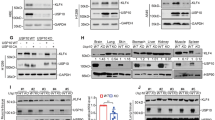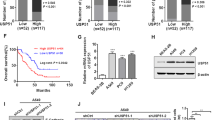Abstract
To determine the potential tumor suppressor functions of ubiquitin-specific protease 10 (USP10) in lung cancer and elucidate underlying molecular mechanism. The relative expression of USP10 was determined by real-time PCR and immunoblotting. The inhibitory effect of USP10 on tumor growth was demonstrated on allograft mice with Lewis carcinoma cell inoculation. The relative cell proliferation was measured with Cell Counting Kit-8 (CCK-8). The invasive capacity was evaluated by transwell assay. The interaction between USP10 and Phosphatase And Tensin Homolog (PTEN) was examined by co-immunoprecipitation. Ubiquitination/deubiquitination was analyzed by immunoprecipitation followed by immunoblotting. USP10 was down-regulated in lung cancer. Knockdown of USP10 promotes tumor growth and invasion both in vitro and in vivo. We further demonstrated that USP10 directly interacted with and stabilized PTEN via deubiquitination. The pro-cancerous effect of USP10 deficiency was abolished by re-introduction of PTEN. We suggested a tumor suppressor function of USP10 in lung cancer via deubiquitinating and stabilizing PTEN.





Similar content being viewed by others
References
Siegel RL, Miller KD, Jemal A (2016) Cancer statistics, 2016. CA Cancer J Clin 66(1):7–30
Hirsch FR et al (2017) Lung cancer: current therapies and new targeted treatments. Lancet 389(10066):299–311
Jung KJ, Jeon C, Jee SH (2016) The effect of smoking on lung cancer: ethnic differences and the smoking paradox. Epidemiol Health 38:e2016060
de Groot P, Munden RF (2012) Lung cancer epidemiology, risk factors, and prevention. Radiol Clin North Am 50(5):863–876
Tsao AS et al (2016) Scientific advances in lung cancer 2015. J Thorac Oncol 11(5):613–638
Pal A, Young MA, Donato NJ (2014) Emerging potential of therapeutic targeting of ubiquitin-specific proteases in the treatment of cancer. Cancer Res 74(18):4955–4966
Yuan J et al (2010) USP10 regulates p53 localization and stability by deubiquitinating p53. Cell 140(3):384–396
Liu J et al (2011) Beclin1 controls the levels of p53 by regulating the deubiquitination activity of USP10 and USP13. Cell 147(1):223–234
Boulkroun S et al (2008) Vasopressin-inducible ubiquitin-specific protease 10 increases ENaC cell surface expression by deubiquitylating and stabilizing sorting nexin 3. Am J Physiol Renal Physiol 295(4):F889–F900
Bomberger JM, Barnaby RL, Stanton BA (2010) The deubiquitinating enzyme USP10 regulates the endocytic recycling of CFTR in airway epithelial cells. Channels (Austin) 4(3):150–154
Zhang M et al (2016) Ubiquitin-specific peptidase 10 (USP10) deubiquitinates and stabilizes MutS homolog 2 (MSH2) to regulate cellular sensitivity to DNA damage. J Biol Chem 291(20):10783–10791
Zeng Z et al (2014) Prognostic significance of USP10 as a tumor-associated marker in gastric carcinoma. Tumour Biol 35(4):3845–3853
Liu H et al (2014) MicroRNA-191 promotes pancreatic cancer progression by targeting USP10. Tumour Biol 35(12):12157–12163
Chalhoub N, Baker SJ (2009) PTEN and the PI3-kinase pathway in cancer. Annu Rev Pathol 4:127–150
Zhang J et al (2013) Deubiquitylation and stabilization of PTEN by USP13. Nat Cell Biol 15(12):1486–1494
Jochemsen AG, Shiloh Y (2010) USP10: friend and foe. Cell 140(3):308–310
Ortega-Molina A, Serrano M (2013) PTEN in cancer, metabolism, and aging. Trends Endocrinol Metab 24(4):184–189
Carnero A et al (2008) The PTEN/PI3K/AKT signalling pathway in cancer, therapeutic implications. Curr Cancer Drug Targets 8(3):187–198
Mehenni H et al (2005) LKB1 interacts with and phosphorylates PTEN: a functional link between two proteins involved in cancer predisposing syndromes. Hum Mol Genet 14(15):2209–2219
Yim EK et al (2009) Rak functions as a tumor suppressor by regulating PTEN protein stability and function. Cancer Cell 15(4):304–314
Vemula S et al (2010) ROCK1 functions as a suppressor of inflammatory cell migration by regulating PTEN phosphorylation and stability. Blood 115(9):1785–1796
Trotman LC et al (2007) Ubiquitination regulates PTEN nuclear import and tumor suppression. Cell 128(1):141–156
Wang X et al (2007) NEDD4-1 is a proto-oncogenic ubiquitin ligase for PTEN. Cell 128(1):129–139
Lin Z et al (2013) USP10 antagonizes c-Myc transcriptional activation through SIRT6 stabilization to suppress tumor formation. Cell Rep 5(6):1639–1649
Pan L et al (2014) Deubiquitination and stabilization of T-bet by USP10. Biochem Biophys Res Commun 449(3):289–294
Draker R, Sarcinella E, Cheung P (2011) USP10 deubiquitylates the histone variant H2A.Z and both are required for androgen receptor-mediated gene activation. Nucleic Acids Res 39(9):3529–3542
Acknowledgements
None.
Author information
Authors and Affiliations
Corresponding author
Ethics declarations
Conflicts of interest
The authors declare that they have no conflict of interest.
Research involving human participants and/or animals
All procedures performed in studies involving human participants were in accordance with the ethical standards of the institutional and/or national research committee and with the 1964 Helsinki declaration and its later amendments or comparable ethical standards. All applicable international, national, and/or institutional guidelines for the care and use of animals were followed.
Informed consent
Informed consent was obtained from all individual participants included in the study.
Rights and permissions
About this article
Cite this article
Sun, J., Li, T., Zhao, Y. et al. USP10 inhibits lung cancer cell growth and invasion by upregulating PTEN. Mol Cell Biochem 441, 1–7 (2018). https://doi.org/10.1007/s11010-017-3170-2
Received:
Accepted:
Published:
Issue Date:
DOI: https://doi.org/10.1007/s11010-017-3170-2




